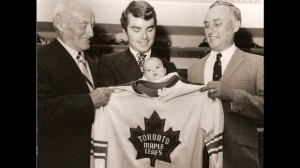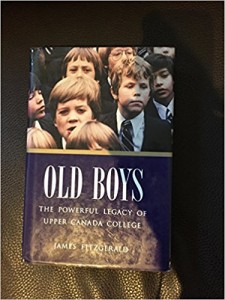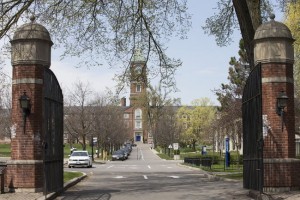James Fitzgerald has given us a fantastic gift. In compiling stories spanning decades, he has created a national treasure of personal accounts and anecdotes of the men who attended Upper Canada College in Toronto. For those of us, who, like me, had a boyfriend, a father, a grandfather, uncles, cousins and a brother at the school, I gained much insight into a culture that played a significant role in shaping the history of our family. The book describes what a same-sex education has to offer privileged males who run on pure competition. Win or lose, sink or swim: it is a game of Darwin’s social contract brought to the playing fields. What Fitzgerald brought to the project is an almost impossible feat: asking males to describe what they felt about things. Spoken as one who spent years asking the same questions, and for the most part, only ending up with precious few answers, I am in awe of this work.
An all-male academy, complete with cadet training and church parades, how they dazzled us in their uniforms. We delighted us to see the Old Boys come out, fathers and grandfathers, all headed to St. Paul’s Cathedral in the springtime. Church was a part of the curriculum, but it seems after reading this book, that something was lost in the translation. Ceaseless, relentless, ruthless bullying went on from faculty to student, to the weakest and most vulnerable among them, the little boys in the prep. It was a gut-wrenching read at times, but I could not put the book down. I barely slept; it was as if I was handcuffed to it. I appreciated the honesty with which these former students described the joys and sorrows of being enrolled at U.C.C. Obviously, a contributor might fear to speak out against a system that favored corporal punishment and lots of it. It would be considered a sign of weakness to many; I can imagine the collective bird this book caused among the old guard, but that is all well and good. Violence foisted from the strong to the weak, from those in authority to those in their charge, should and ought to be discussed because the repercussions can go down through the generations. The stranglehold on one’s psyche can be crushing. I have witnessed casualties. Tribalism can be without mercy; the consequences of which can be hideous. Parts of the book read like a horror story. Since I lived it and saw it close at hand, I know the toll all too well.
No institution, no matter how revered, can afford to be seen only through the prism of nostalgia. I applaud James Fitzgerald, whose family goes all the way back to the beginning of the school, for speaking truth to power. Are we as a society so steeped in materialism, social connections, and avenues of success, that we stand back in silence and watch the warping of men’s souls? If training warriors is the intended goal, then they must be lead by the strongest and wisest of men, true heroes that boys look up to in worship. The sadness I felt on page after page, had to do with opportunities lost. Jesuit education, for instance, seeks to enrich body, soul, and mind. It is a mistake for any colony to be ruled by hanging on to traditions of peoples who have long since assimilated and adapted.
It is my great hope that this book will help many who still feel the sting. My fondest wish is that in the future, the school ponies up, finds great teachers and leaders, pays them well beyond the going rate and develops an accurate model of leadership. To do any less short-changes the future.
 Four generations of old boys from Upper Canada College in the Smythe family.
Four generations of old boys from Upper Canada College in the Smythe family.



